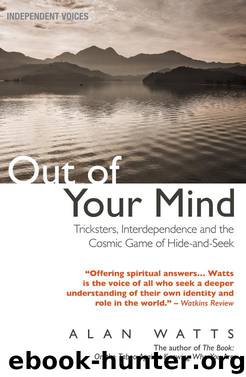Out of Your Mind by Alan Watts

Author:Alan Watts [Alan Watts]
Language: eng
Format: epub
ISBN: 9780285644090
Publisher: Souvenir Press
Published: 2018-03-13T04:00:00+00:00
11
Nonduality in Action
I want to talk now about an aspect of Zen practice called “going straight ahead.” A student once asked his master, “What is the Tao?” — that is, “What is the way?” — and the master replied, “Walk on.” Today we would say, “Go!” — as in, “Go, man, go!” This aspect of Zen refers to detachment — having a mind that isn’t sticky or one that doesn’t fumble, wobble, or hesitate. When Zen teachers ask students a question, they expect an immediate answer, one without premeditation or deliberation. In Zen, they speak of a kind of person who “doesn’t depend on anything.” This means a person who doesn’t rely on formulas, theories, or beliefs to govern their actions.
It’s very difficult for us to function this way. We’ve been brought up to believe that there are two sides to ourselves: an animal side and a human — that is to say, civilized — side. Freud referred to these as the side of the pleasure principle/animal nature/id and the reality principle/social nature/superego; and in his view, these two sides of a person are in constant battle. Theosophists speak of a higher, spiritual self and a lower, psychic (ego-oriented) self. And if you look at things in this way, the problem of life is to make your better self take charge of your lower self — like a rider taking charge of a horse. But here’s the real problem: How would you know if what you think is your higher self isn’t really your lower self in disguise? When a thief robs a house and the cops get called, they enter the house on the ground floor while the thief climbs the stairs to the next floor up. And when the police go up to that floor, the thief climbs up to the next. In the same way, when we feel ourselves to be the lower self — that is, a separate ego — the moralists come along and say, “Don’t be selfish,” so the ego tries to pretend it’s good by identifying with a higher self.
Why do you believe you have a higher self? Have you seen it? Do you know that it’s there? No. You just want to do your duty or behave like a proper member of society. But that’s all a great phony front. If you don’t know there’s a higher self, and you believe that there is one, on whose authority do you believe this? Buddhists might cite the Buddha, Hindus might say the Upanishads, Christians will say Jesus. The Baltimore Catechism begins, “We are bound to believe that there is but one God, the Father Almighty, Creator of Heaven and Earth,” and Catholics look down upon Protestants for interpreting the Bible however they’d like without any authoritative version. But this ignores the fact that Catholics choose to accept the authority of the church to interpret the Bible for them. In other words, it must become clear to you that you yourself create all the authorities you accept.
Download
This site does not store any files on its server. We only index and link to content provided by other sites. Please contact the content providers to delete copyright contents if any and email us, we'll remove relevant links or contents immediately.
| Anthropology | Archaeology |
| Philosophy | Politics & Government |
| Social Sciences | Sociology |
| Women's Studies |
The remains of the day by Kazuo Ishiguro(9000)
Tools of Titans by Timothy Ferriss(8398)
Giovanni's Room by James Baldwin(7347)
The Black Swan by Nassim Nicholas Taleb(7131)
Inner Engineering: A Yogi's Guide to Joy by Sadhguru(6797)
The Way of Zen by Alan W. Watts(6615)
The Power of Now: A Guide to Spiritual Enlightenment by Eckhart Tolle(5784)
Asking the Right Questions: A Guide to Critical Thinking by M. Neil Browne & Stuart M. Keeley(5775)
The Six Wives Of Henry VIII (WOMEN IN HISTORY) by Fraser Antonia(5516)
Astrophysics for People in a Hurry by Neil DeGrasse Tyson(5191)
Housekeeping by Marilynne Robinson(4449)
12 Rules for Life by Jordan B. Peterson(4305)
Ikigai by Héctor García & Francesc Miralles(4275)
Double Down (Diary of a Wimpy Kid Book 11) by Jeff Kinney(4273)
The Ethical Slut by Janet W. Hardy(4258)
Skin in the Game by Nassim Nicholas Taleb(4250)
The Art of Happiness by The Dalai Lama(4130)
Skin in the Game: Hidden Asymmetries in Daily Life by Nassim Nicholas Taleb(4007)
Walking by Henry David Thoreau(3963)
